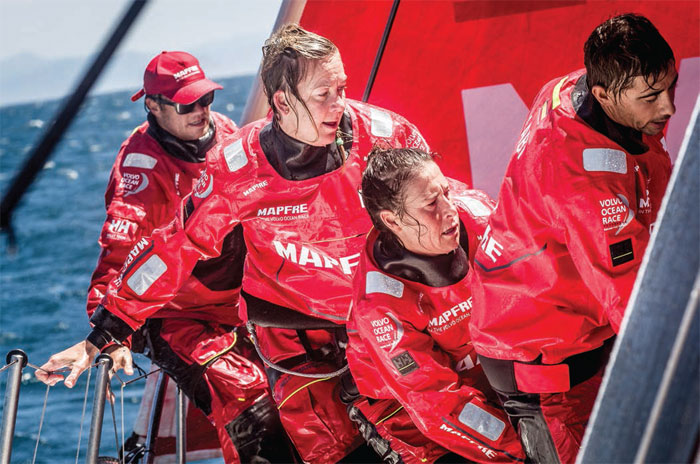

A realistic time frame but still a big challenge
The Ocean Race’s Horizon programme, a partnership with The Magenta Project, World Sailing Trust and PA Consulting, focuses on inclusion, equality, and diversity, and is paired with a commitment to a 50:50 gender balance by 2030. Both are critical moves, with actions ranging from the development of leadership programmes, research of improvements in yacht design and building, to shadow opportunities across various departments. This commitment sets an itinerary for training and creates entry points for suitably skilled sailors through mentoring and crew matching.
Sailing is a lifelong venture for countless people and the saying ‘you don’t stop sailing when you get old, you get old when you stop sailing,’ is true across the sport. Looking across the top racing fleets today, it is not uncommon to see some of the sport’s legends (now in their 60s) still going strong, products of club sailing and hard work.
While many sports rely on clear-cut timelines from beginner to professional via a route paved with training centres and clinics, sailing is different. The recent trend being that, if by the age of 30 you’re not involved in a pro offshore or inshore team, you probably never will be. Sailing an Olympic campaign offers a clearer A to B then C, to reach D, and the success of those who do carries on past the Games, landing them in the world’s leading circuits.
Events such as SailGP Inspire and Youth America’s Cup create opportunities for young sailors to fastforward their careers and sail with the very role models they admire in the sport. What these don’t account for are those sailors already in the industry, who have not followed the Olympic pathway, but have the experience and skills and yet no accessible entry point. Furthermore, these programmes pose even harsher limitations on the experienced female sailors not young enough to qualify for youth spots, and yet not experienced enough to lead these teams, leaving them with nowhere to go. With a movement across all sports encouraging girls to persist past their teenage years, it does seem that our sport is moving the problem up the line, nudging skilled women out in their 30s and 40s.
Currently, there is a mature skills gap at the heart of many elite teams, particularly for women who have the skills required to compete at the highest level. This disparity highlights the lack of guidance for anything outside Olympic campaigning. Consequently, Olympic medalists are seen transitioning into all disciplines, making the Games the only reliable conduit into major sailing tours.
French offshore sailing leads the way; a successful sailing empire with countless training and apprenticing opportunities based on skills and ambitions, regardless of age or sailing class of interest. Industry collaborations have developed a clear path in offshore racing: from Mini Transat to Figaro, Class 40, and Imoca 60. Not surprisingly, French sailors also dominate the female offshore talent pool.
The logical way forward for the rest of the industry is to develop links between A (i.e. my first Wasp or my first Fastnet) and D (SailGP or The Ocean Race), presenting steps towards each level and transitions between them. A careful execution of this ensures our sport remains diverse and meaningful.
Similar to the groundbreaking work of Horizon, organisations like RORC are in a unique position to bridge this gap and are a logical place for skippers from The Ocean Race to search for skilled offshore sailors, or those in the making. The RORC Crew Match sits alongside Tendrr, RailMeets, Rolex MSR and others, as platforms where skippers find crew. These platforms aren’t yet widely used but with focused development and joined forces, they could provide one solution to this disconnect in opportunities.
It takes community support and a network eager to make connections and create clearer progression in sailing; apprenticeships and mentorships are proven catalysts for successful careers. Since 2018, The Magenta Project Mentoring Programme has matched 167 female sailors from around the world with top talent to help accelerate their careers, from Olympic campaigns to Ocean Races. Mentees gain new skills through workshops and clinics, as well as new opportunities through their mentor, fellow mentees, and strong alumni network.
Circuits, MNAs, classes, and clubs can implement similar programmes to pave more pathways in sailing on a smaller scale. Learn how and join The Magenta Project’s non-profit programmes and mission for more diversity and inclusion in sailing. »
We invite you to read on and find out for yourself why Seahorse is the most highly-rated source in the world for anyone who is serious about their racing.
To read on simply SIGN up NOW
Take advantage of our very best subscription offer or order a single copy of this issue of Seahorse.
Online at:
www.seahorse.co.uk/shop and use the code TECH20
Or for iPad simply download the Seahorse App at the iTunes store


